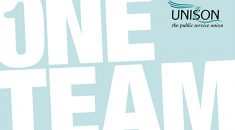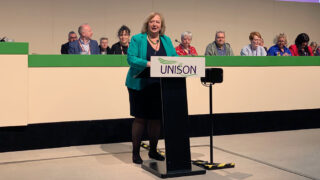Surging Omicron cases are leaving hospitals struggling to cope and health workers guilt-stricken at the potential harm to patients, according to reports received by UNISON from staff at 40 NHS trusts across England.
Over the past week, UNISON’s acute, ambulance and community health branches across England have been providing the union with reports on the state of local staffing levels. These detail the impact of the longstanding workforce crisis – exacerbated by Omicron – on the NHS.
Covering the week to Wednesday (12 January), the seven-day snapshot paints a worrying picture, says UNISON.
Nurses, porters, healthcare assistants and other NHS staff tell of their growing anxiety that acute staffing shortages are forcing them to work outside their normal areas of expertise. They also voice concern about the impact of lengthy treatment delays on patient recovery and survival.
First-hand accounts from the union’s health branches suggest trust managers are resorting to desperate measures, says the union.
These include chasing staff off sick to return early, directing those on wards to send patients home more quickly and asking exhausted employees to cancel annual leave, as well as taking on extra shifts too.
Information provided by staff reveals employers are attempting to tackle workforce gaps by cancelling operations, reducing appointments and frequently moving staff around to provide critical cover. Trust managers are also offering enhanced overtime rates, appealing for volunteers from the public, and asking retired employees and health students for assistance.
Staff report more challenging working conditions, including an increase in angry and abusive patients, working intensively without breaks, working with unfamiliar, temporary staff and in areas where they don’t feel confident.
Feedback from health workers suggests some of these stopgap initiatives from trust managers are helping a bit, but that much more is needed.
Short-term solutions suggested by staff include better wages to encourage burnt-out colleagues to stay and persuade new recruits to join, overtime rates to match those paid to agency staff, safe rest areas and a commitment that leave can be taken as soon as possible.
Health workers also want the mandatory vaccine deadline postponed to stave off further staff losses this winter, and for trusts to go back to providing lateral flow test kits so they can return to work more quickly.
There was a strong message from staff that the NHS needs significant, long-term investment in its workforce if it is ever to be able to deliver the standard of care that patients deserve.
Commenting on the snapshot reports from health workers, UNISON head of health Sara Gorton said: “Employers are using desperate measures to cope with desperate times. But stretching dwindling numbers every thinner cannot solve this staffing crisis.
“With the latest figures showing six million people awaiting treatment and thousands waiting at least 12 hours to be seen in A&E departments, the toll on staff of witnessing endless patient suffering cannot be underestimated.
“The government might have been unable to predict the rampant spread of Omicron. But ministers were well aware of the endemic staffing shortages across the entire NHS and the intolerable pressures this created.
“The NHS has been running on empty for years. Never again must the pleas from staff, employers and unions for urgent action on staffing numbers be ignored.
“The pandemic has shown what happens when too few staff try to do the jobs of many thousands. Ministers must act now, pay the wages NHS staff deserve and do their utmost to solve this damaging staffing crisis.”
Notes to editors:
– The snapshot is based on situation reports provided by a sample of UNISON health branches across England. They were asked for examples of the impact of staffing shortage pressures from 6 to 12 January 2022.
– Comments from staff included:
“When working short staffed, patients are not receiving optimum care. This makes us feel guilty.”
“Staff have been redeployed on an ad hoc basis to A&E, which creates a lot of stress. They don’t know the area and aren’t trained to work in it.”
“Experienced 999 call-takers have left because they can no longer cope with the call queue and having no respite between calls.”
“Longstanding, experienced nursing staff are taking their pensions and leaving, with no plans to retire and return as they might have done pre-Covid.”
“Give staff time out every working day – say an extra 30 minutes to try to relax. Provide staff on busy wards with free meals.”
– UNISON is the UK’s largest union with more than 1.3 million members providing public services in education, local government, the NHS, police service and energy. They are employed in the public, voluntary and private sectors.
Media contacts:
Liz Chinchen M: 07778 158175 E: press@unison.co.uk
Fatima Ayad M: 07508 080383 E: f.ayad@unison.co.uk





